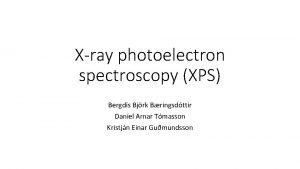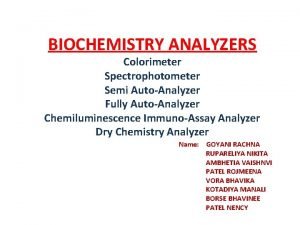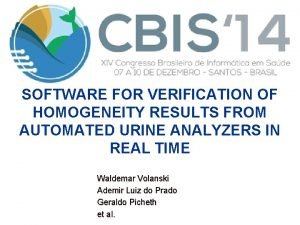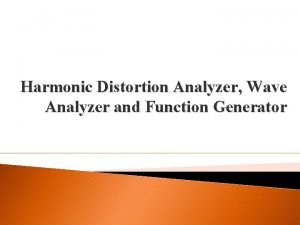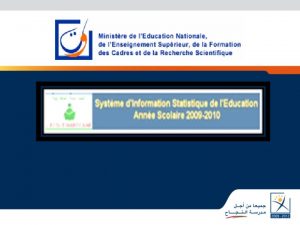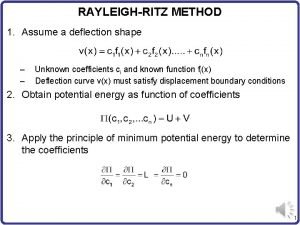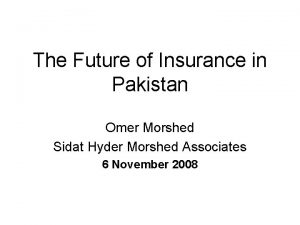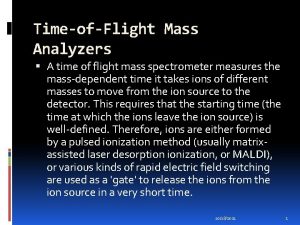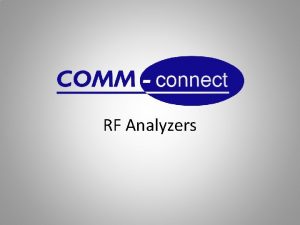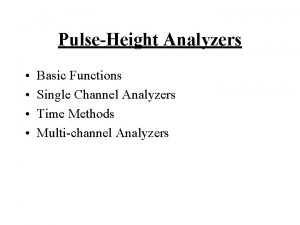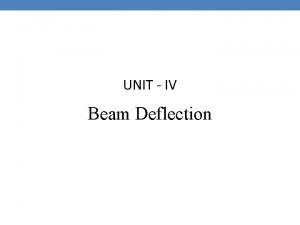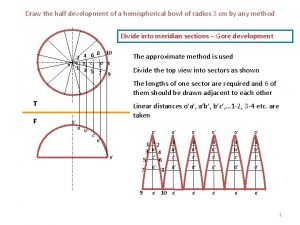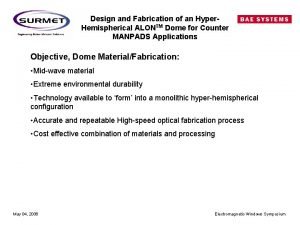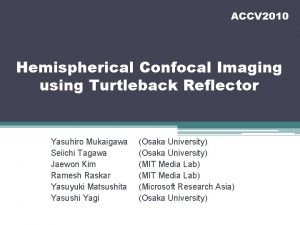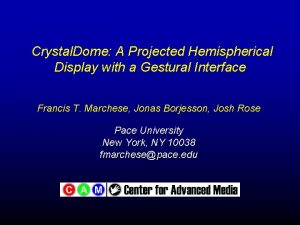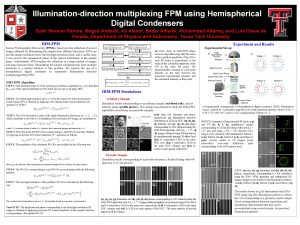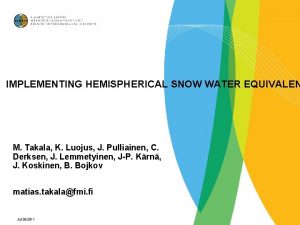Timeofflight Analysis of Hemispherical Deflection Analyzers Omer SISE













- Slides: 13

Time-of-flight Analysis of Hemispherical Deflection Analyzers Omer SISE 1 and Theo J. M. ZOUROS 2, 3 1 Dept. 2 Dept. of Science Education, Faculty of Education, Suleyman Demirel University, 32260 Isparta, Turkey of Physics, Univ. of Crete, P. O Box 2208, GR 71003 Heraklion, Greece. E-mail: tzouros@physics. uoc. gr 3 Tandem Accelerator Laboratory, INPP, NCSR Demokritos, GR 15310 Ag Paraskevi, Greece

Motivation • The hemispherical deflector analyzer (HDA) has become increasingly popular in electron spectroscopy, due to several advantages including – a) superior energy resolution approaching the sub me. V level, – b) the use of flexible transfer lens systems that can be operated in different modes, optimizing selectively transmission, spatial resolution or angular resolution and – c) high efficiency by using a fast, high-resolution twodimensional position sensitive detector (PSD). 26. 08. 2015 BPU 9 - 24 -27 Aug 2015 Istanbul 2

• For conventional electron spectroscopy, the flight time of electrons in an analyzer of this type is unimportant. • However – if an HDA is used to record phenomena varying rapidly in time as in synchrotron and freeelectron laser (FEL) investigations, or – if it is coupled to another detector in an electron–electron coincidence setup, Neppl et al. 2014, Faraday Discussions the travel times of the electrons through the analyzer become an important point of consideration. Sise et al. 2011, PRA 26. 08. 2015 BPU 9 - 24 -27 Aug 2015 Istanbul Sise, 2011, Ph. D(ns) Thesis Time 3

The variation of the time spread Δt and energy spread ΔE as a function of pass energy E 0. A suitable compromise between good energy resolution and good time resolution is clearly needed. 26. 08. 2015 BPU 9 - 24 -27 Aug 2015 Istanbul 4

Theoretical background The 1/r potential of an ideal HDA The exit radius rπ Time of flight at the exit tπ 26. 08. 2015 Zouros and Benis, 2002, JESRP Sise and Zouros, 2015, JSPEC BPU 9 - 24 -27 Aug 2015 Istanbul 5

Elliptical (Kepler) trajectories of charged particles in the ideal HDA Elliptical orbits with the same kinetic energy for different α 26. 08. 2015 BPU 9 - 24 -27 Aug 2015 Istanbul 6

Ideal and Fringing Field HDA The time-of-flight and the exit radius are plotted as a function of launching angle In (d), the conventional fringing field HDA (black squares) is seen to have a much larger and asymmetric spread as a function of α, far from 1 st order focusing conditions. The two paracentric entries, however, have much narrower spreads demonstrating full 1 st order focusing, and therefore much improved energy resolution. 26. 08. 2015 BPU 9 - 24 -27 Aug 2015 Istanbul 7

Calculated spot size and timeenergy distributions c R 0 = 82. 55 mm 26. 08. 2015 R 0 = 101. 6 mm BPU 9 - 24 -27 Aug 2015 Istanbul R 0 = 116 mm 8

Calculated spot size and timeenergy distributions c R 0 = 82. 55 mm 26. 08. 2015 R 0 = 101. 6 mm BPU 9 - 24 -27 Aug 2015 Istanbul R 0 = 116 mm 9

The two paracentric entries for the fringing field HDA are seen in (c) and (d) to have near ideal field HDA distributions. 26. 08. 2015 BPU 9 - 24 -27 Aug 2015 Istanbul 10

Variation of the figures of merit g and G with pass energy E 0. The two fringing field paracentric entries are seen to have near ideal field behavior 26. 08. 2015 BPU 9 - 24 -27 Aug 2015 Istanbul 11

Summary and Conclusion • We have explored for the first time, the time-of-flight properties of the biased paracentric HDA for the two special entry positions. • Overall, both biased paracentric entries should prove themselves to be superior to the conventional HDA entry both in timing as well as in energy resolution applications. 26. 08. 2015 BPU 9 - 24 -27 Aug 2015 Istanbul 12

Acknowledgement This research has been co-financed by the European Union and Greek national funds through OP: Education and Lifelong Learning, Research Program: THALES. References 1. 2. 3. 4. 5. T. J. M. Zouros and E. P. Benis, Journal of Electron Spectroscopy and Related Phenomena, vol. 125, no. 3, pp. 221– 248, 2002. Omer Sise and Theo J. M. Zouros, Journal of Spectroscopy, vol. 2015, Article ID 153513, 20 pages, 2015. SIMION v. 8. 1, url: http: //simion. com T. J. M. Zouros and E. P. Benis, Applied Physics Letters 86 (2005) 094105. The APAPES collaboration homepage: http: //apapes. physics. uoc. gr/ 26. 08. 2015 BPU 9 - 24 -27 Aug 2015 Istanbul 13
 Hemispherical breast
Hemispherical breast Concentric hemispherical analyzer
Concentric hemispherical analyzer Thats all thank you
Thats all thank you Semi autoanalyzer
Semi autoanalyzer Urine analyzers
Urine analyzers Harmonic distortion analyzer ppt
Harmonic distortion analyzer ppt Engelliler için yatak merdiveni
Engelliler için yatak merdiveni Sise.men.gov.esise
Sise.men.gov.esise Esise/ma.gov.men.sise //http
Esise/ma.gov.men.sise //http Marcel duchamp şişe askılığı
Marcel duchamp şişe askılığı Yanmayan bardak deneyi
Yanmayan bardak deneyi Rayleigh ritz method for simply supported beam
Rayleigh ritz method for simply supported beam Omer morshed
Omer morshed Omer tripp
Omer tripp

